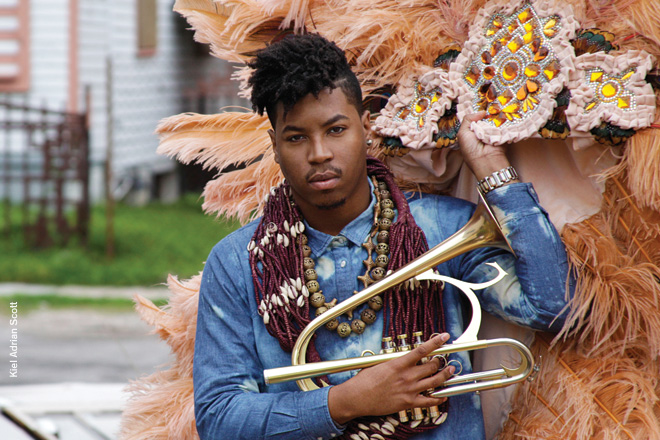CHRISTIAN SCOTT
Connecting past and present in one genre-stretching collection
Christian aTunde Adjuah isn’t just the title of Christian Scott’s new double album—it represents a new phase in the jazz trumpeter’s life. “I felt my experience is indicative of someone who probably shouldn’t be called Scott all the time,” says the New Orleans native, explaining why he now goes by Christian aTunde Adjuah Scott, completing a tie to his African heritage. “I didn’t destroy the name—the Scott part of my history is valid as well. It was just something I needed to clarify.”
The cover art of the 23-track collection—which depicts Scott attired in the full, flamboyant regalia of the New Orleans Mardi Gras Indian—also goes a long way toward explaining his desire to connect past and present. His uncle, alto saxophonist Donald Harrison Jr., is a chief proponent of the Indian tradition, and Scott, 29, learned much about the legacy from the older musician. More important, Harrison taught his nephew about maintaining versatility and open-mindedness. “Donald is a perfect hybrid,” says Scott. “You’d be hard-pressed to find any style of jazz that he hasn’t fully acculturated into his playing. He’s also the most rogue character that I can think of musically. That served as a great example for me when I was younger.”
Fittingly, the album is Scott’s most ambitious and far-reaching work yet. Recorded with guitarist Matthew Stevens, keyboardist Lawrence Fields, bassist Kristopher Keith Funn and drummer Jamire Williams, and produced by Scott and Chris Dunn, the leader’s new compositions draw a direct line from the early New Orleans jazz to today’s cutting edge. Scott calls his approach “stretch music.” “This is the first fully realized stretch music album where you can hear the many contexts and the vernacular that we throw in,” he explains. “You can take one song, like ‘Fatima Aisha Rokero 400,’ and there’s stuff that ties into the Black Indian tradition in New Orleans, and stuff that sounds like Radiohead, and a Sergio Leone spaghetti western. What we’re trying to do is figure out a way to create a genre-blind improvisational form.”
Now that he’s so successfully wed past and present, look for Scott to elaborate further on future projects. “I think it’s time to come home a bit,” he says, “and deal with some of those New Orleans rhythms.”
–Jeff Tamarkin




comment closed